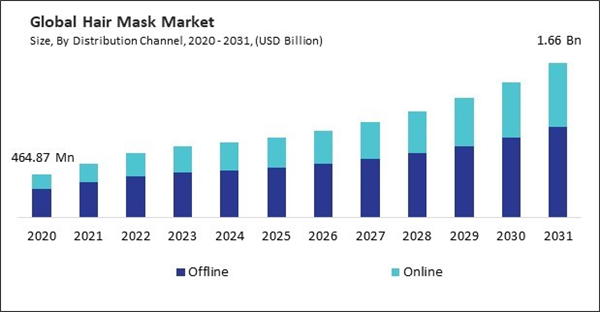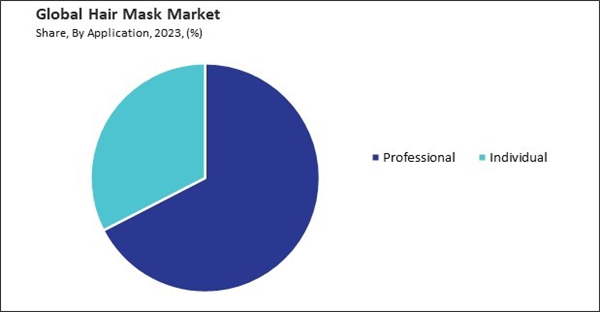The influence of social media and beauty influencers in the region has significantly driven the demand for hair care products, including hair masks. The increasing focus on personal grooming and adopting Western beauty trends has further fueled the market growth in the Asia Pacific region. Therefore, the Asia Pacific region generated 1/4th revenue share in the market in 2023. In terms of volume, 55.03 million units of hair masks are expected to be utilized in this region by the year 2031. The growth in this region can be attributed to the rising awareness of hair care and beauty products, increasing urbanization, and the growing middle-class population with higher disposable incomes. The expanding e-commerce in countries like China, India, and Japan has also made hair masks more accessible to a broader consumer base. Moreover,
The self-care and wellness trend contributes to the heightened awareness of hair health. People are investing more time and resources into grooming and personal care, viewing it as an integral part of their well-being. Hair masks, which offer a spa-like treatment at home, are becoming popular as part of these self-care rituals. Additionally, the influence of social media and beauty influencers is further amplifying the demand for natural and organic hair masks. Influencers often highlight the benefits of using clean and green beauty products, sharing their personal experiences and endorsements with their followers. This type of word-of-mouth marketing can be incredibly powerful, increasing consumer trust and a higher likelihood of product adoption. As a result, the demand for natural and organic hair masks is expected to grow significantly in the coming years.
However, Manufacturers of natural hair masks also face challenges in ensuring product stability and longevity without compromising on the natural formulation. Developing effective preservative systems that are both natural and safe is a complex task, often requiring significant research and development investment. These challenges in formulation and preservation can lead to higher production costs, passed on to consumers, further limiting the market for natural hair masks. Thus, natural hair masks' limited shelf life and storage challenges are impeding the market's growth.
Driving and Restraining Factors
Drivers- Rising Demand for Natural and Organic Hair Care Products
- Growing Awareness About Hair Health and Maintenance
- Increasing Incidence of Hair and Scalp Problems
- High Cost of Premium Hair Mask Products Limiting Mass Market Adoption
- Limited Shelf Life and Storage Challenges of Natural Hair Mask
- Increasing Influence of Social Media and Beauty Influencers
- Rising Disposable Income and Changing Lifestyle Patterns
- Availability of Alternative Hair Care Treatments and Products
- Potential for Allergic Reactions and Sensitivities to Ingredients
Product Outlook
Based on product, the market is divided into thermal steam mask and steam-free mask. The steam-free mask segment acquired 70% revenue share in the market in 2023. In terms of volume, 68.89 million units of Steam-free sleep masks are expected to be utilized by the year 2031. Steam-free masks are easy to use without additional heat or special equipment, which appeals to consumers seeking a more straightforward, no-fuss hair care solution. These masks often contain rich ingredients designed to hydrate, strengthen, and protect hair without heat, making them suitable for a broader range of hair types and concerns.Application Outlook
On the basis of application, the market is segmented into individual and professional. In 2023, the individual segment attained 33% revenue share in the market. In terms of volume, 34.43 million units of conventional hair masks are expected to be utilized by individuals by the year 2031. This growth can be attributed to the rising trend of at-home hair care routines, as more consumers opt for DIY hair treatments to maintain healthy, nourished hair without visiting a salon. The increasing availability of hair masks in retail and e-commerce channels, as well as a growing awareness of hair health and the benefits of using specialized products, have contributed to the demand in the individual segment.Distribution Channel Outlook
Based on distribution channel, the market is categorized into offline and online. In 2023, the offline segment registered 64% revenue share in the market. In terms of volume, 58.86 million units of hair masks are expected to be sold through offline channel by the year 2031. This is primarily due to the continued preference for traditional shopping experiences, where consumers can physically inspect and purchase hair masks from brick-and-mortar stores such as supermarkets, drugstores, beauty salons, and specialty stores. The offline segment benefits from the ability to provide immediate product availability, personalized shopping experiences, and the ability for customers to consult with store staff about the best product for their hair care needs.Nature Outlook
By nature, the market is divided into organic and conventional. In 2023, the conventional segment registered 72% revenue share in the market. In terms of volume, 76.54 million units of conventional hair masks are expected to be utilized by the year 2031. This can be attributed to the long-standing popularity of conventional hair masks, which often contain a mix of synthetic ingredients known for their immediate and effective results. These products are widely available, are more affordable, and are commonly used by consumers seeking quick and targeted solutions for common hair concerns such as dryness, damage, and frizz.Hair Type Outlook
Based on hair type, the market is divided into dry, frizzy, curly, and others. In 2023, the frizzy hair segment procured 27% revenue share in the market. In terms of volume, 27.41 million units of hair masks for frizzy hair are expected to be utilized by the year 2031. Frizz is a common concern for many individuals, especially in humid climates, and it is often linked to dryness, damage, and lack of moisture retention. Hair masks designed to combat frizz, smooth the hair cuticle, and restore its natural texture have become increasingly popular. The growing awareness of frizz-reducing hair treatments and the demand for products that provide long-lasting smoothness and manageability have contributed to the growth of this segment.Regional Outlook
Region-wise, the market is analyzed across North America, Europe, Asia Pacific, and LAMEA. The North America region witnessed 37% revenue share in the market in 2023. In terms of volume, 55.03 million units of hair masks are expected to be utilized in this region by the year 2031. This dominance can be attributed to the high consumer awareness regarding hair care products, numerous established hair care brands, and a strong retail infrastructure that facilitates the widespread availability of hair masks. The increasing trend of self-care and at-home beauty treatments has also contributed to the market growth in this region. Additionally, the high disposable income and the willingness of consumers to spend on premium hair care products further bolster the market.List of Key Companies Profiled
- L'Oréal S.A.
- Shiseido Company Limited
- Unilever PLC
- Henkel AG & Company, KGaA
- The Procter & Gamble Company
- Johnson & Johnson
- Revlon, Inc. (MacAndrews & Forbes)
- Kao Corporation
- Davines S.p.A.
Market Report Segmentation
By Nature (Volume, Thousand Units, USD Billion, 2020-2031)- Conventional
- Organic
- Professional
- Individual
- Offline
- Online
- Dry
- Frizzy
- Curly
- Other Hair Types
- Steam-Free Mask
- Thermal Steam Mask
- North America
- US
- Canada
- Mexico
- Rest of North America
- Europe
- Germany
- UK
- France
- Russia
- Spain
- Italy
- Rest of Europe
- Asia Pacific
- China
- Japan
- India
- South Korea
- Australia
- Malaysia
- Rest of Asia Pacific
- LAMEA
- Brazil
- Argentina
- UAE
- Saudi Arabia
- South Africa
- Nigeria
- Rest of LAMEA
Table of Contents
Companies Mentioned
- L'Oréal S.A.
- Shiseido Company Limited
- Unilever PLC
- Henkel AG & Company, KGaA
- The Procter & Gamble Company
- Johnson & Johnson
- Revlon, Inc. (MacAndrews & Forbes)
- Kao Corporation
- Davines S.p.A.










